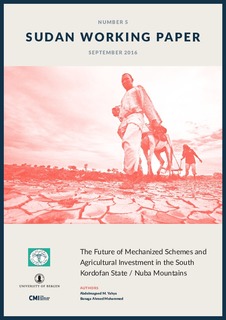The Future of Mechanized Schemes and Agricultural Investment in the South Kordofan State / Nuba Mountains
Working paper
Permanent lenke
http://hdl.handle.net/11250/2475203Utgivelsesdato
2016-09-01Metadata
Vis full innførselSamlinger
- Publications [1488]
Originalversjon
Bergen: Chr. Michelsen Institute (Sudan Working Paper no. SWP 2016:5)Sammendrag
Abstract This paper tackles the issue of the future of mechanized schemes and investment in the agricultural sector in the South Kordofan State/Nuba Mountains. The main objective of this study is to assess the viability of investment in mechanized scheme areas in South Kordofan, such as Habila, which witnessed the intervention of mechanized farming in the 1960s. The study suggests that there are overlapping socio-economic, political, environmental and security factors that have affected the process of investment in agriculture in the area. The approach is multi-disciplinary and the researchers relied on secondary and primary data by using diverse sources and techniques. The study documents that the socio-economic, political and security environments emerging in South Kordofan over the last two decades have seriously changed the conditions for investments in the Habila area. Indicators show that Habila is no longer a part of the planning for agricultural investment in South Kordofan. Other areas, such as the AbuJubaiha, Talodi and Kalogi localities are the areas with most potential for future investment, because of the availability of lands free from disputes and conflicts. However, factors other than security are also relevant for the willingness of investors to focus on these areas. The productivity of land shows a deteriorating trend as a result of overexploitation. Confusion following the two contradicting land ownership systems emerging out of the civil war, as well as environmental changes, have resulted in the emergence of disputes and conflicts in the mechanized schemes of the Habila area. The appearance of Village Development Committees indicates that the future of investments in the agricultural sector in Habila is ambiguous and discouraging.
